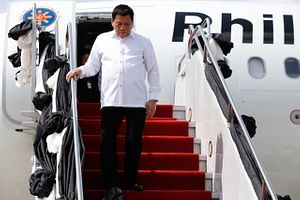Philippine President Rodrigo Duterte has enjoyed excellent popularity ratings since coming to office more than a year ago, with an overwhelming majority of Filipinos applauding his bloody crackdown on drug dealers despite the arbitrary deaths of thousands of people.
However, there are signs those ratings are starting to slide, causing a rethink on policy. Some in the media and civil society speculate that the president’s ruthless and contrived macho attitude is finally taking a toll on his presidency. In fact, that is not quite the case.
Duterte made many promises while campaigning for last year’s election. His belittling of the previous president, Benigno Aquino III, as being lazy and for his failure to end corruption, and his stated commitment to improve the economic standing of ordinary Filipinos, were chief among his campaign rhetoric.
By most accounts Duterte inherited a healthy economy that was ticking over nicely, at least according to the government authorities, think tanks, and business people who tend to forget that this country still has a quarter of its population living below the poverty line.
Many, many more are simply struggling to make ends meet, and many of them likely backed Duterte on the basis of his promises to share the nation’s wealth more equitably and improve the lot of the country’s less well-off.
So far this simply hasn’t happened. The economy today has not moved since Aquino’s time in office. and it’s starting to show.
According to Social Weather Stations, trust and satisfaction in Duterte’s personality and performance has fallen to the lowest ebb of his presidency.
His net satisfaction rating dropped 18 points to +48 over the month of September, while his net trust rating fell 15 points to +60 after thousands of Filipinos demonstrated against the killing of a teenager amid the war on drugs, which has so far claimed more than 3,900 lives.
Another Pulse Asia survey found 80 percent said they trust and approve of Duterte, down but only slightly from 81 percent and 82 percent, respectively, in June.
Duterte’s slide in the opinion polls remains slight. His ratings are still considered “very good” and would be the envy of many a politician, U.S. President Donald Trump among them. However, the results are mixed at best and disappointing at worst, with an overall trend-line heading in the wrong direction.
That feeds into the broader point: while Duterte was quick off the mark in targeting drug dealers – with little regard for the law, killing of innocents, or the needless trauma his policies have inflicted upon the families of the dead – his attitude to the economy has been left wanting.
Charito Plaza, director general of the Philippine Economic Zone Authority (PEZA), recently said that about 500 billion pesos ($9.7 billion) worth of investments was at risk due to bureaucratic delays in establishing economic zones, and that this could result in investors moving to neighboring countries.
“Some of these investors are telling me their principals are already telling them to look or transfer in Vietnam,” she said, contradicting government promises to propel the Philippines into a golden age through infrastructure development.
Higher taxes are being touted for the mining industry, efforts to end shoddy labor practices have barely materialized, and critics argue that the rooting out of corrupt government officials has unsurprisingly more to do with political affiliations and allegiances than ending systemic graft.
In the meantime, Duterte has attempted to deflect any criticism and blame at home by playing on local prejudices with meaningless jabs at the West. Europe has been his latest target, amid his threats to expel EU ambassadors.
Duterte’s Philippines bears all the hallmarks of his worst predecessors, in particular Ferdinand Marcos, whose autocratic style, gross corruption, and use of the military and martial law won his country comparisons with the tin-pot South American dictatorships of the 1980s.
Filipinos have proven hardy in tolerating the violent excesses of Duterte and his ilk. But the hip pocket is where it matters most, and that, according to the current trend-line, could be Duterte’s Achilles heel.
Luke Hunt can be followed on Twitter @lukeanthonyhunt

































